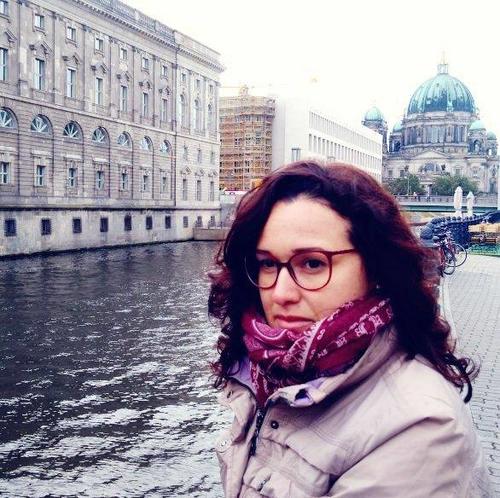Angela Lima, history at the Latin America Institute
At which university did you study and what?
I studied history at the Universidade Federal de Santa Catarina in Brazil, where I also did my Master's degree in Cultural History on immigration policy in Brazil in the 19th century. At the moment I am a PhD student in History at LAI (Latin America Institute).
What are you currently doing at Freie Universität Berlin?
I am currently doing my doctoral research with the help of a so-called sandwich grant from the Conselho Nacional de Pesquisas Tecnológicas (CNPq / National Council of Technological Research) under the direction of Prof. Dr. med. Stefan Rinke. The doctorate consists of documentary research in Berlin archives and libraries as well as participation in weekly research colloquia of the LAI.
How did you come up with the idea to do your doctorate in Germany and why did you choose the Freie Universität Berlin?
During my master's program in 2012, I had the opportunity to spend a year abroad at the University of Cologne. It was a great experience and very helpful for my later application for the PhD project. During this time I was able to deepen my studies of the German language and get to know aspects of the culture of historical research developed in Germany. Therefore, the idea of coming back for the doctorate was always present. And past experiences have influenced my new research topic, namely the city of Berlin and its environmental aspects, in particular developed agricultural practices in urban environments and the use of the city in times of war. In that sense, it was not just the documentary research in Berlin for me, but also the experience in the city that shaped me and brought me further.
I chose Freie Universität because of the proximity of my Brazilian advisor, Prof. Joao Klug, to the university where he had already completed his postdoctoral position. He encouraged me in the election and highlighted the structure and good cooperation between the Latin American and German researchers.
Who or what helped you with your preparations for your stay at the Freie Universität Berlin? Which tips were helpful?
My Brazilian advisor as well as Prof. Rinke and his assistant Karina Kriegesmann helped me a lot in the preparation of my stay. In addition, the University's Student Service Center was always very friendly and helpful. From help with finding a flat, through activities at the university to visa issues, I was able to solve all the problems with their help.
What are your expectations for the future after your doctorate at the Freie Universität?
I will return to Brazil where I will defend my thesis. But I would also like to return to Germany to do a postdoc here. In Brazil, I intend to continue working in the field of historical research, despite growing difficulties in Brazil ...
What problems or difficulties did you face and how did you solve them?
Since I had lived in Germany before, the difficulties were not so great. I think the main problem was finding accommodation, which can be quite difficult in Berlin. It was also a challenge to speak German again. That's why I've tried to speak German as often as possible and not dodge to English. I like to communicate in German, and I think it is appreciated if you make an effort.
Is there a specific aspect of the Freie Universität Berlin that you particularly liked?
Especially the atmosphere I find very pleasant. The campus is beautiful and the staff amiable. In addition, there are many different events that allow you to experience the university in many ways.
What do you like most about life in Germany?
I am thrilled with the way Germans enjoy their free time, reading a book in the park, sunbathing, drinking beer with friends, enjoying a flea market or strolling through the city on a beautiful day. In addition, I am impressed by the efficient organization and public transport. I really enjoy the cultural life that the city offers. There are always many interesting things to do. And of course I can not forget the beauty of every season, especially spring.
What advice would you give to Brazilians who are interested in a doctorate in Germany?
I would say that you should be open-minded and ready to learn the language. Although she seems difficult, she is very logical and beautiful. I also recommend that you enjoy the city and the people you meet. Living with the Germans teaches us a lot!
Of course, the varied cuisine and beer must not be missed!
What is your favorite word in German?
There are many .... but I like to hear "wunderschön"/"beautiful", which is always said with a smile!

